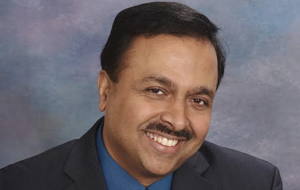(This interview is part of a series highlighting the winners of the Georgia CIO Leadership Association CIO of the Year Awards. Read the intro to this series here.)
Ebix is a leading international supplier of software and e-commerce services to the insurance, financial and healthcare industries with more than 40 offices around the globe. Its Corporate Vice President of Technology Muthu Arumugham recently won the CIO of the Year award from the Georgia CIO Leadership Association in the corporate category. Arumugham cited that changing the perception of IT from functional overhead to revenue driver is one of his greatest accomplishments in this role.
With more CEOs looking to their CIOs and IT leaders for initiatives that drive revenue along with cost containment, we wanted to ask Arumugham how he overcame challenges related to changing this perception of IT. He also told us what he looks for in IT talent when building a team that can go above and beyond.

The Enterprisers Project (TEP): Can you talk about why revenue generation coming from IT is so important in today’s landscape?
 Arumugham: There’s only so much a head of technology can do in terms of cost management. I truly believe in the philosophy that everyone is in sales and everyone is in service role, regardless of what their job title says. Everyone has to do their part to take care of existing customers in order to retain revenue and to help the sales team in acquiring new clients. And since all companies are becoming technology companies, IT is no longer a backend service. It’s in the center of the enterprise strategy now. So business strategy and technology strategy are no different – they're one and the same.
Arumugham: There’s only so much a head of technology can do in terms of cost management. I truly believe in the philosophy that everyone is in sales and everyone is in service role, regardless of what their job title says. Everyone has to do their part to take care of existing customers in order to retain revenue and to help the sales team in acquiring new clients. And since all companies are becoming technology companies, IT is no longer a backend service. It’s in the center of the enterprise strategy now. So business strategy and technology strategy are no different – they're one and the same.
At Ebix, our solution in the early 2000s was being sold as a software license model. Now, we are primarily a major SaaS provider, which is a win-win for everybody – our customers and Ebix – because it generates an additional line of revenue for the company. It also keeps customers happier because they have a single point of accountability. And for IT this means that in addition to containing the cost, we’re playing a role in top-line revenue growth.
TEP: What were some challenges you faced in changing the mindset both within and outside of the IT organization – and how did you overcome them?
Arumugham: We all know that people don’t like change; habits die hard, right? But often, once they implement the change and realize the benefit, they ask, “Why didn’t we do this sooner?” Culture is often an underestimated facet of change – and I mean both the company culture as well as the social culture. Some companies have a “we know everything” kind of culture, and I’ve found that these companies have a more difficult time with change than the company with a “we can learn from others” culture.
You also have to have a lot of patience. It’s rare that you send a memo to all employees on a Friday and see the change in place come Monday. But as long as you continue to show and educate on the benefits, you will begin to see some traction. One thing that doesn’t go over very well with me is when someone says, “This is how we have been doing it for the last 15-20 years.” That’s not a good enough reason for me to keep going in the same way. As a fast-paced industry, we cannot keep supporting the status quo and still be competitive in the marketplace. So change must happen, regardless of the challenges standing in the way.
TEP: Can you share some of the ways you motivate your team to go above and beyond?
Arumugham: I strive to lead by example, and my philosophy is that I wouldn’t ask my team members to sacrifice more than what I’m willing to do. As an example, a couple of years ago, I was on a vacation and, as Murphy’s law goes, on the very first day of my vacation, I got an email that we had a major problem in one of our platforms. The situation deteriorated badly, and I had to cut short my vacation and fly into headquarters to resolve the issue. That sends a message, not only to my team members but to the management, to our customers – everybody. With a phone connection, Internet, etc., I could have been anywhere. But I visited our headquarters so I could be in the war room with the team.
In terms of recognizing and praising the work and sacrifices of those on my team, you have to be very sincere, and the praise has to be well-deserved. If you praise frequently for something that they think is part of their duty, they’re not going to value that compliment as much as when they have a very high yardstick and are praised when they truly cross it. Many of my past employees have sent emails stating they are gratefule to me for setting the bar so high as it has propelled them to perform at their best.
TEP: What are some traits that you look for in IT hires. Can you explain how these traits translate into success in IT?
Arumugham: I like to hire people who take their job seriously, but don’t take themselves seriously. In this line of business, people work long hours, sometimes late nights and weekends. So you want to have people who can navigate through stressful times with a sense of humor. Trust is absolutely important as people have to own their mistakes instead of passing the blame. It is very critical in a technology company like ours because if people don’t own their mistakes, the root cause analysis of a problem becomes a lot more complex. So people on my team know that if they make a mistake, they come clean, learn from it, and try not to make the same mistake a second time.
Balanced ego is also important in my field. It’s not whose idea it was that’s important but the merit of the idea. Just because somebody in a high-level position is saying one thing, it doesn’t mean that a person who knows better on the ground cannot say another. I often tell my team – and this is a quote from Colin Powell – I don’t want a yes man on my team, because that means one of us is redundant.
TEP: What do you like best about being a part of the Georgia CIO Leadership Association?
Arumugham: The Georgia CIO Leadership Association team is incredible. They are extremely talented yet very humble, and they make certain that members are taken care of. GCLA was one of the first professional networks I joined after moving from Southern California, and what I like about it is that it’s both exclusive and inclusive. It’s exclusive in the sense that not everybody can become a member. They have a stringent guideline they follow. But it’s inclusive in that once you are a member, the amount of support you get from the fellow members is amazing. People are very generous with their time and ideas, and I learn a lot from everyone involved.






